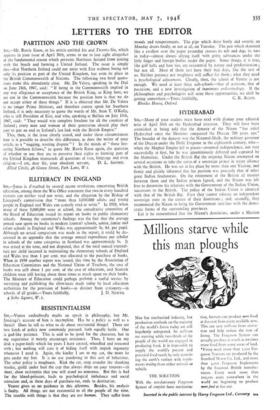ILLITERACY IN ENGLAND
SIR,—Janus is cFsturbed by several recent revelations concerning British education, among them the War Office statement that two in every hundred recruits can neither read nor write, and the allegation by the Bishop of Liverpool's commission that " more than 3,000,000 adults and young people in England and Wales can scarcely read or write." In 1928, when many of these 3,000,000 were at school, the consultative committee of the Board of Education issued its report on books in public elementary schools. Among the committee's findings was the fact that the average annual sum spent on books in modern (central) schools, senior, junior and infant schools in England and Wales was approximately' Is. 8d. per pupil. Although no actual comparison was made in the report, it could be dis- covered in an appendix that the average annual expenditure per scholar in schools of the same categories in Scotland was approximately 5s. It was stated at the time, and not disputed, that of the total annual expendi- ture per child incurred in maintaining the elementary schools of England and Wales less than 1 per cent. was allocated to the purchase of books. When in 1939 another report was issued, this time by the Association of Education Committees and the National Union of Teachers, the cost of books was still about 1 per cent. of the cost of education, and Scottish children were still having about three times as much spent on their books. The Ministry of Education could perhaps perform a useful service by surveying and publishing the allowances made today by local education authorities for the provision of books—as distinct from stationery—in schools of all grades.—Yours faithfully, J. D. NEWTH. 4 Soho Square, W. z.


































 Previous page
Previous page